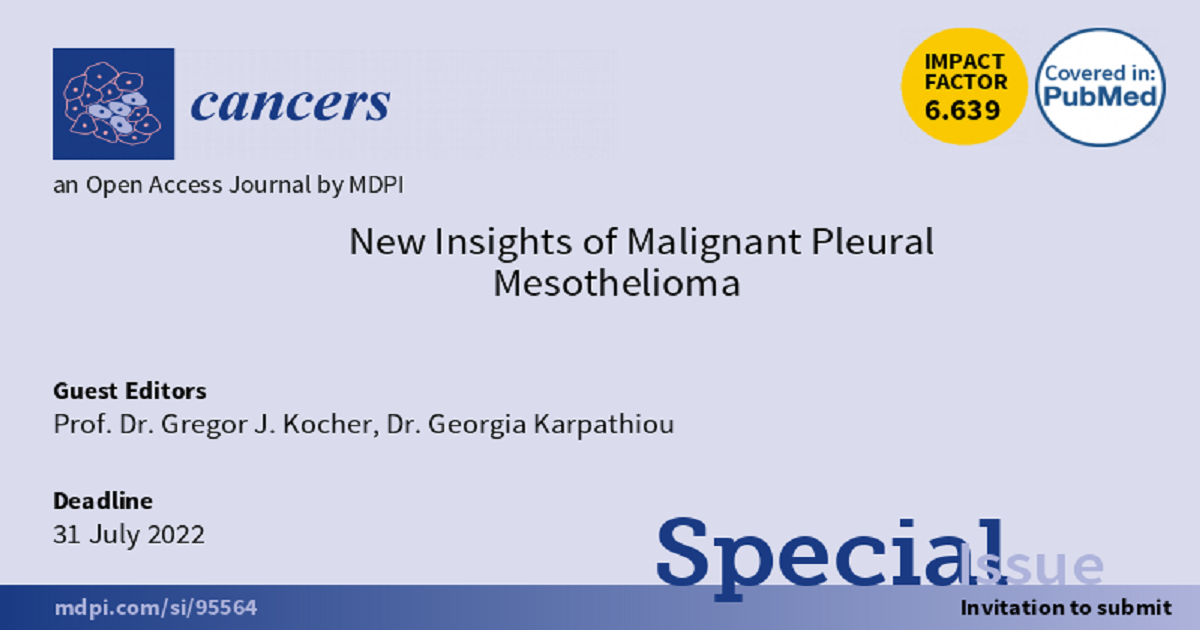New Insights of Malignant Pleural Mesothelioma
A special issue of Cancers (ISSN 2072-6694).
Deadline for manuscript submissions: closed (31 March 2023) | Viewed by 14341

Special Issue Editors
2. Department of Thoracic Surgery, St. Claraspital, Basel, Switzerland
Interests: robotic thoracic surgery; uniportal VATS; lung cancer; mesothelioma; mediastinal disease
Special Issues, Collections and Topics in MDPI journals
Interests: pathology; differential diagnosis; pathogenesis; immunohistochemistry; molecular biology; biomarkers; immune microenvironment; pleural pathology
Special Issues, Collections and Topics in MDPI journals
Special Issue Information
Dear Colleagues,
Malignant pleural mesothelioma (MPM), although a relatively rare disease, is one of the most aggressive and most difficult to treat cancers affecting the thoracic cavity. Systemic treatment in the form of chemotherapy as well as local treatment in the form of radiation therapy and/or surgery have all been studied in the past either as a sole treatment option, or in combination with each other, but no treatment regimen has proven to be very effective against MPM.
While the surgical strategy, which focuses on maximal cytoreduction, has evolved from very invasive procedures such as extrapleural pneumonectomy with resection of the pericardium and diaphragm, to less invasive procedures such as pleurectomy/decortication (in selected cases even in the form of minimally invasive video-assisted procedures (VATS)), newer and less toxic systemic agents have also been developed, which are the result of a better understanding of the specific tumor biology. The molecular and morphologic features of this disease are being progressively elucidated and offer a more precise diagnosis.
The aim of this Special Issue is to present the newest developments concerning treatment options for MPM, including basic and translational research, and clinical data of different surgical and combination strategies, but also insights into its pathogenesis, molecular biology, pathology, and diagnosis. In this Special Issue, original research articles and reviews are welcome.
We look forward to receiving your contributions.
Prof. Dr. Gregor J. Kocher
Dr. Georgia Karpathiou
Guest Editors
Manuscript Submission Information
Manuscripts should be submitted online at www.mdpi.com by registering and logging in to this website. Once you are registered, click here to go to the submission form. Manuscripts can be submitted until the deadline. All submissions that pass pre-check are peer-reviewed. Accepted papers will be published continuously in the journal (as soon as accepted) and will be listed together on the special issue website. Research articles, review articles as well as communications are invited. For planned papers, a title and short abstract (about 250 words) can be sent to the Editorial Office for assessment.
Submitted manuscripts should not have been published previously, nor be under consideration for publication elsewhere (except conference proceedings papers). All manuscripts are thoroughly refereed through a single-blind peer-review process. A guide for authors and other relevant information for submission of manuscripts is available on the Instructions for Authors page. Cancers is an international peer-reviewed open access semimonthly journal published by MDPI.
Please visit the Instructions for Authors page before submitting a manuscript. The Article Processing Charge (APC) for publication in this open access journal is 2900 CHF (Swiss Francs). Submitted papers should be well formatted and use good English. Authors may use MDPI's English editing service prior to publication or during author revisions.
Keywords
- malignant pleural mesothelioma
- carcinogenesis
- chemotherapy
- chemoresistance
- immunotherapy
- checkpoint inhibitors
- surgery
- combination therapy
- pathogenesis
- diagnosis
- molecular biology
- pathology
- effusion
- thoracoscopy
Benefits of Publishing in a Special Issue
- Ease of navigation: Grouping papers by topic helps scholars navigate broad scope journals more efficiently.
- Greater discoverability: Special Issues support the reach and impact of scientific research. Articles in Special Issues are more discoverable and cited more frequently.
- Expansion of research network: Special Issues facilitate connections among authors, fostering scientific collaborations.
- External promotion: Articles in Special Issues are often promoted through the journal's social media, increasing their visibility.
- Reprint: MDPI Books provides the opportunity to republish successful Special Issues in book format, both online and in print.
Further information on MDPI's Special Issue policies can be found here.






